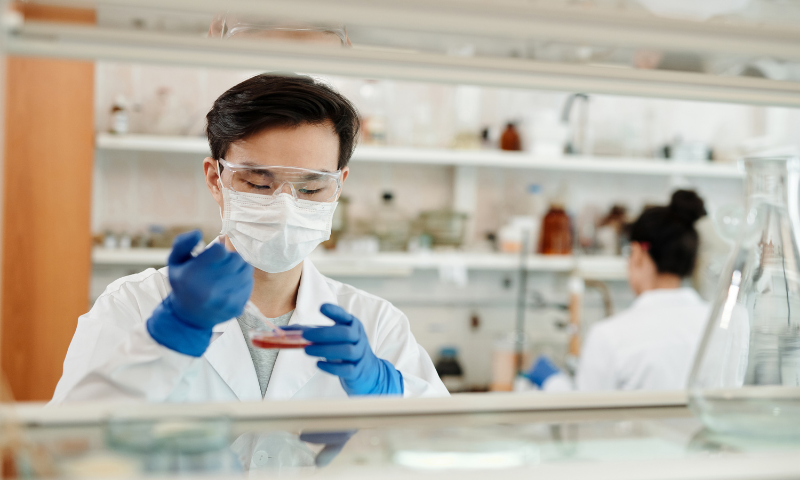The CPT℠ Microbiology Division offers unique testing capabilities based on our clients’ evolving needs. Having accumulated nearly 50 years of experience, we specialize in providing compendial and ‘custom’ microbiological testing services to the OTC/Rx Drug, Cosmetic/Personal Care, Medical Device, and Specialty Chemical industries.
Operating from our state-of-the-art testing facility, we offer a wide range of microbiological/antimicrobial testing and consulting services.
CPT℠ is registered with the FDA as a GMP/GLP/GCP testing establishment and our Microbiology Division is also ISO/IEC 17025:2017 accredited (Accreditation # 80071) for nearly all types of microbiological testing.
Antimicrobial Testing Capabilities
The CPT℠ Microbiology Division offers a wide range of antimicrobial effectiveness testing services to assist our clients in developing and launching safe and effective products. Following are just a few examples:
Antimicrobial Effectiveness Testing
The most basic test for determining whether any product’s preservative system is suitable for its unique formulation and recommended usage is Antimicrobial Effectiveness Testing (AET), sometimes referred to as Preservative Efficacy Testing (PET). Employing this methodology, a product’s preservative system is ‘challenged’ by introducing known quantities of microorganisms so as to determine if the preservative system can successfully withstand such challenges. The CPT℠ Microbiology Division employs US and international compendial methodologies (USP <51>, EP 5.1.3 and ISO 11930), in addition to well-recognized organization-backed methods such as the Personal Care Products Council (PCPC).
Antimicrobial effectiveness testing may also be conducted on unpreserved antimicrobial products such as Hand Sanitizers. In products such as these, either In Vitro or In Vivo (human clinical) testing may be performed. This will not only verify their efficacy but can also address safety and labeling claims.
In-Vitro Time-Kill Studies
CPT℠ offers testing of formulations using in vitro antimicrobial efficacy methods to determine the “time-kill” or “rate” of antibacterial / antifungal activity. This testing is conducted at the concentration and contact times determined by the client, or by the regulatory requirements established for the product type. Such testing is conducted employing representative aerobic and anaerobic microorganisms.
Zone of Inhibition
A “zone of inhibition” test is a screening tool that is used to determine the antimicrobial activity of a test material against target microorganisms such as bacteria, yeast, and mold. For this type of testing, an agar plate is streaked with a standardized culture of microorganism and allowed to dry. Next, an agar well or penicylinder is filled with a solution of the test material and incubated at the temperature required by the organism for growth. As the test material diffuses through the agar, a zone of inhibition (a ‘clear’ zone) within the microorganism is formed thereby demonstrating that the sample has antimicrobial activity.
Minimum Inhibitory Concentration (MIC)
This method is performed by preparing doubling dilutions of the test material in bacterial or fungal growth medium in test tubes. A standardized culture of each selected microorganism is inoculated at all concentrations into each tube and incubated at the required temperature. After incubation, the lowest concentration with no visible microbial growth is the MIC. In terms of drug discoveries, studying MICs often allows for the development of larger preclinical trials and more advanced antimicrobial studies.
Antiplaque and Antigingivitis Testing
Developing products such as mouthwashes or denture cleansers requires antimicrobial research to verify claims and safety while adhering to regulatory guidelines. This involves either MIC or In Vitro Time Kill testing as per the Antiplaque and Antigingivitis FDA OTC Drug Monograph.
Anti-Acne Product Testing
When developing a topical anti-acne product, both in vitro and in vivo testing are often employed. In Vitro time kill studies can be performed by the CPT℠ Microbiology Division using Cutibacterium acnes at specific contact times to determine anti-acne efficacy of the product. Specialized In Vivo (human clinical) anti-acne studies can also be designed by the CPT℠ Clinical Division which can help determine the efficacy and safety of a product, and/or its key active ingredients.
Custom Research Projects / Client-Specific Protocols

Based on the varied needs of our clients, CPT℠ offers custom research and regulatory consulting services. Our well-seasoned staff can assist you in designing and executing unique testing schemes for the assessment of your antimicrobial product of any type. Why not give us a call today?


